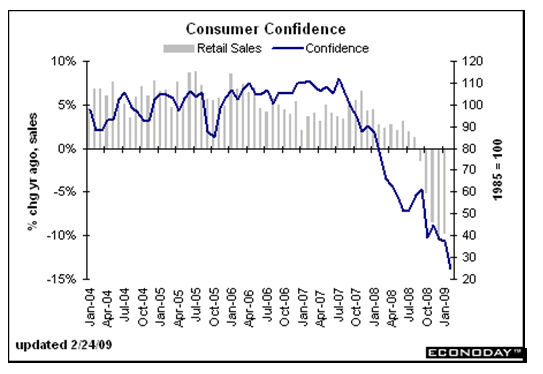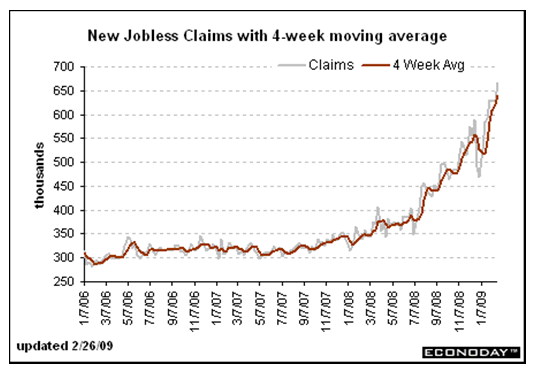A Crisis of Confidence
Economics / Recession 2008 - 2010 Feb 27, 2009 - 05:07 PM GMTBy: Andy_Sutton

 A scan of the financial and economic landscape of any society during solid, genuinely prosperous times will always reveal a populace brimming with confidence. Confidence in their ability to make a living, confidence in the ability of their leaders, confidence in the workings of their financial markets to whatever extent they exist, and ultimately confidence in the strength of their money. These factors are all interlocking directorates - take any one of them away and you'll witness an economy that is no longer efficient and begins to stumble. Take them all away and you'll witness unbridled economic chaos.
A scan of the financial and economic landscape of any society during solid, genuinely prosperous times will always reveal a populace brimming with confidence. Confidence in their ability to make a living, confidence in the ability of their leaders, confidence in the workings of their financial markets to whatever extent they exist, and ultimately confidence in the strength of their money. These factors are all interlocking directorates - take any one of them away and you'll witness an economy that is no longer efficient and begins to stumble. Take them all away and you'll witness unbridled economic chaos.
It is the latter statement that causes me to reflect this week on the prospects for our return to prosperity. We have had the opportunity over the past year to listen to many speeches from Presidents to heads of Treasury and the Federal Reserve. Many men and women - bright men and women, have weighed in and opined on our current situation. They've spoken of stimulus, of consumer spending, government spending, bridges, roads, healthcare, energy, banks, and many other topics too numerous to count in this short space. However, what I haven't heard nearly enough mention of is confidence even though the stated purpose and intent of these speeches has been to inspire the same.
The confidence of consumers
One report in particular has made some inroads in terms of getting coverage of the precipitous drop in overall consumer confidence. And in fact, the most recent release of the Conference Board's measurement of consumer confidence was the worst in history since measurements began more than 40 years ago. Perhaps the worst part of this report was the expectations component, which absolutely fell off a cliff, plunging from a level of 42.5 to a 27.5 level. The jobs component of the report was no better. 47.3% of those surveyed expect there to be fewer jobs in the future with a mere 7.1% expecting more jobs. 4.4% thought jobs are easy to find with nearly half (47.8%) opining that finding a job is difficult. The chart below tells the awful story.

It is fairly easy to see how the lack of confidence has translated into overall drops in retail sales. Sure people are spending less for gasoline (a major component of retail sales) than they were a year ago, but they certainly aren't buying anything else in its place either.
This situation, however, goes way beyond some numbers reported every month. It goes to the very heart of the opening paragraph. Confidence is the key to a successful economy, particularly ours, which is so heavily dependent on the consumer taking on debt and spending money. In order to perpetuate this dynamic, the consumer needs to have utmost confidence. As last 2008's failed stimulus package demonstrates, simply handing money to consumers who are not confident will result in the money being saved or used to pay off existing bills. No confidence, no spending. It's as simple as that.
Collapse of retirement contributions a referendum on confidence in the financial system
Whether it is along with, beside, or because of consumer's confidence, equity markets on a global scale have crashed in grand form over the past year. Sure, not all of that was caused by the little guy selling his 401(k)/IRA and going to cash. It is our opinion that the little guy actually represents a relatively small component of the overall money invested in the markets when leverage is factored in. However, the little guy's actions have still had major ramifications. Consider the following:
- 529 plan contributions are down an average of 60% from 2007 according to a 529 plan representative who materialized at my office door a few weeks ago.
- According to TD Ameritrade, 63% of people with retirement plans stopped contributing to them in 2008.
- Only 21% of individuals surveyed in the above study had more than $50,000 in investable savings.
- Unemployment (32%) and increases in health care premiums (25) were the leading reasons why people stopped contributing to retirement plans in 2008.
- Nearly 25% of survey respondents in the 35-44 age group said they'd completely stopped contributing to retirement accounts in 2008. This more than any other group.
While complete data for 2008 contributions is incomplete due to the fact that 4/15/09 is the deadline for 2008 IRA contributions, it is relatively clear that 2008 contributions will be down significantly. This problem is two-fold. The first is many people don't have the funds to invest. The second is that they have lost confidence in the markets and their ability to protect (let alone grow) capital. This reality is unfolding at an unprecedented time in history - a time when people can least afford to be caught without savings.
Job loss – the ultimate confidence-killer
As now more than 600,000 Americans each week are realizing, the loss of a job is one of the most stressful events one can endure. There is an old adage that it is a recession when your neighbor loses his job, but it is a depression when you lose yours. This is not meant to trivialize the matter of unemployment in the least, but rather to underscore the effect that the loss of one's livelihood has on confidence. As can be expected, consumer confidence has plunged as job losses continue to increase.

Next Friday's unemployment report is likely to feature an unemployment rate well north of 8% not counting the thousands of workers who lost their jobs in late 2007 and early 2008 that have now fallen off the unemployment rolls and as such are no longer counted. By our count, there have been nearly 2.4 million first time claims for unemployment in the past 4 weeks alone and the trend shows no signs of slowing, at least not in the short term. While unemployment insurance lasts up to a year (depending on the state), it only covers a portion of lost earnings. A good average is probably around 60%. I don't know about you, but I don't know too many people who can maintain their current standard of living on 60% of their income – or are even willing to try.
Money – A True Crisis of Confidence
Confidence in the monetary system of the United States has been a true lagging indicator. Inflation at a rate of 5% or so per year has been institutionalized in the system for as long as anyone can remember. Keynesian economics teaches us that this inflation is a normal by-product of growth and should be accepted with glee, which is absolute nonsense. This is akin to welcoming a burglar into your home and offering him 5% of your belongings then chalking it up as a cost of living.
However, even the most regular of folks are starting to wonder where the trillions of dollars for their retirements, healthcare, financial system bailouts, various industry bailouts, state bailouts, government spending, and other pet political projects are going to come from. The fact is we've crossed the Rubicon in this regard. The world no longer creates enough savings to cover our massive balance of payments and fiscal deficits. And remember, one in three Americans have less than $50,000 in savings to deal with this. Everyday Americans are starting to wake up to the reality that this money doesn't exist and must be created from nothing. That certainly doesn't bode well for their confidence in the value of the currency they carry in their pockets. It can no longer be called money, because to call it money is to imply that it is a store of wealth and acts as a standard unit of exchange.
A real store of wealth holds its value and maintains purchasing power. The US dollar has lost around 96% of its purchasing power since the Fed was created in 1913. Other paper currencies are not far behind. This reality has driven record demand for gold and silver coins as the public awakens and attempts to diversify out of paper. This overall loss in confidence in paper assets is what drives mainstream columnists to attack gold as a ‘useless rock' and float the false notion that people who bought stock after the 1929 crash got their money back in a few years when in fact it took a few decades. Remember, it is all about confidence.
In the end, the financial crisis of 2007-? will be summed up as a fairly simple process:
1) Confidence shaken
2) More debt accumulated to maintain confidence
3) Confidence further shaken
4) Even more debt accumulated
5) Confidence lost because of all the debt accumulated
For in fact during the early stages of the crisis, policymakers and pundits alike were busy talking about strong economic fundamentals and failing to address the root causes of the problem when it might have mattered. For nearly 9 months the current depression brewed before Fed head Bernanke and Treasury Secy. Paulson were even willing to admit that a problem existed outside the banking system. The entire sum total of their efforts was to maintain confidence. It was a dangerous gamble that has proven disastrous and they're about to learn the hard way that while you might be able to create a bailout for big banks and big government, there is no bailout for confidence.
Don't miss out on your free copy of our report “The 7 Mistakes Investors make..and how to avoid them” . Get your copy today by going to our website www.suttonfinance.net
By Andy Sutton
http://www.my2centsonline.com
Andy Sutton holds a MBA with Honors in Economics from Moravian College and is a member of Omicron Delta Epsilon International Honor Society in Economics. His firm, Sutton & Associates, LLC currently provides financial planning services to a growing book of clients using a conservative approach aimed at accumulating high quality, income producing assets while providing protection against a falling dollar. For more information visit www.suttonfinance.net
Andy Sutton Archive |
© 2005-2022 http://www.MarketOracle.co.uk - The Market Oracle is a FREE Daily Financial Markets Analysis & Forecasting online publication.


